Diabetes and Sleep: A Complex Bidirectional Relationship
Diabetes and Sleep: A Complex Bidirectional Relationship
Diabetes and sleep share a bidirectional relationship, where poor sleep can contribute to impaired glucose metabolism, and diabetes itself can lead to sleep disturbances. This interplay is crucial for understanding how sleep optimization can be an integral part of diabetes management.
The Science Behind Sleep and Glucose Metabolism
Sleep plays a critical role in regulating glucose homeostasis. During deep sleep, insulin sensitivity is optimized, and growth hormone secretion promotes glucose utilization.
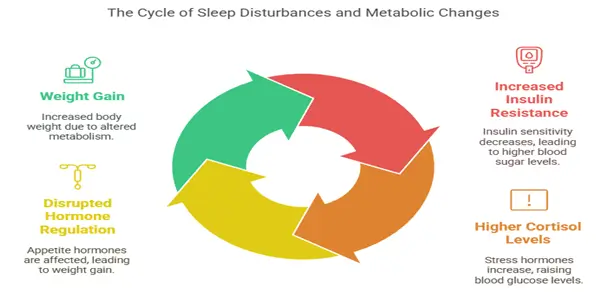
Impact of Sleep on Glucose Metabolism
| Sleep Parameter | Effect on Glucose Regulation |
|---|---|
| Sleep Duration (<6 hours) | Increased insulin resistance, higher fasting glucose |
| Poor Sleep Quality | Elevated cortisol, increased oxidative stress |
| Sleep Fragmentation | Impaired beta-cell function, reduced glucose tolerance |
| Obstructive Sleep Apnea (OSA | Chronic hypoxia leading to insulin resistance |
Sleep Disorders Common in Diabetes
1. Insomnia
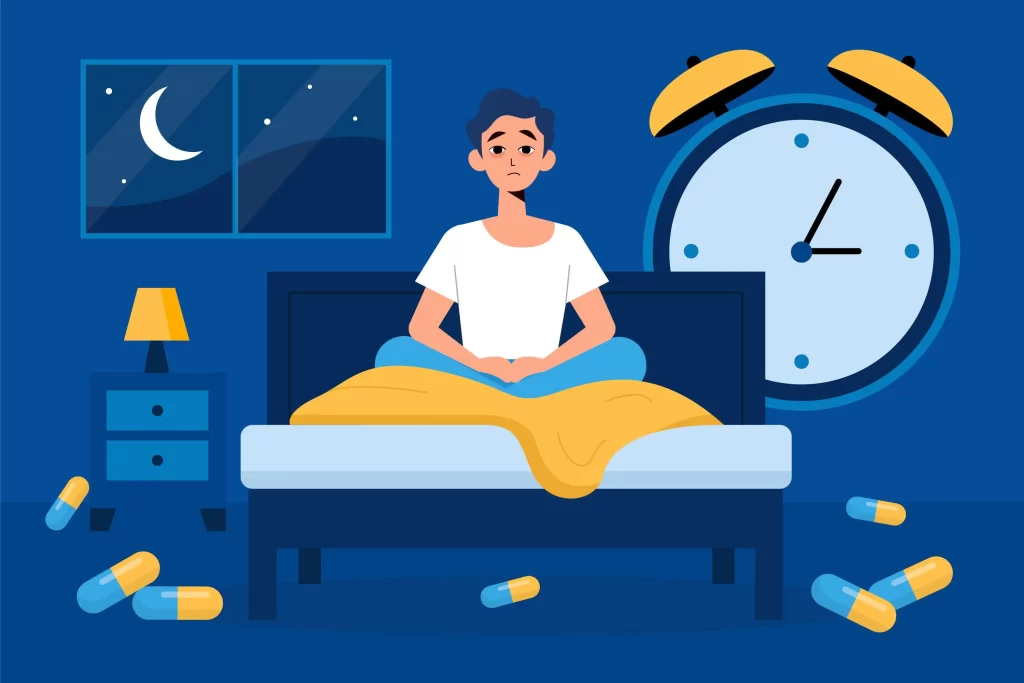
2. Obstructive Sleep Apnea (OSA)
- Increased sympathetic activity
- Higher blood pressure
- Greater insulin resistance

3. Restless Legs Syndrome (RLS):
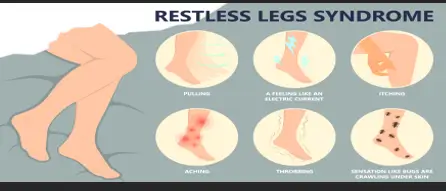
Metabolic pathways linking sleep disorders with the development of Type 2 diabetes
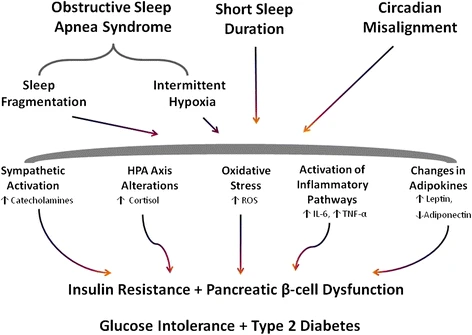
Bidirectional link between obesity, type 2 diabetes mellitus, and obstructive sleep apnea (OSA)
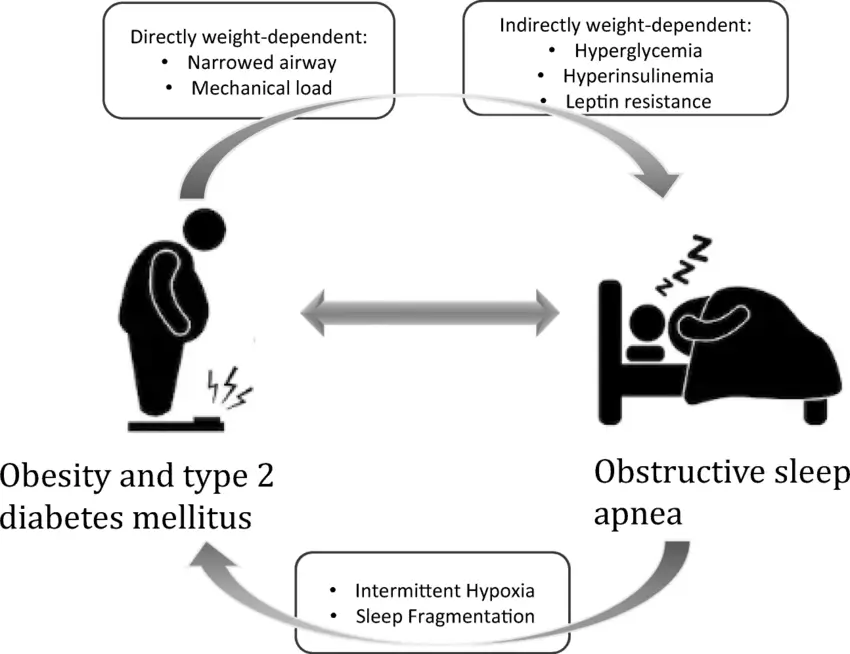
Clinical Evidence Linking Sleep and Diabetes
Several studies have demonstrated the strong association between poor sleep and diabetes risk
- A 2019 study in Diabetes Care found that individuals sleeping <6 hours per night had a 28% higher risk of developing T2D.
- A meta-analysis (2021) revealed that OSA increases the risk of diabetes by approximately 50%.
- A cohort study (2020) showed that fragmented sleep patterns correlate with higher HbA1c levels in people with diabetes.
Strategies to Improve Sleep in Diabetes Management
Optimizing sleep can significantly enhance glycemic control. Recommended strategies include
1. Sleep Hygiene Practices
- Maintain a consistent sleep schedule
- Avoid screens 1 hour before bedtime
- Reduce caffeine and alcohol intake
2. Managing Blood Sugar Before Bedtime
- Avoid high-GI foods at night
- Monitor blood glucose levels
3. Treating Underlying Sleep Disorders
- Screening for OSA in diabetic patients
- Medications or therapies for neuropathic pain and RLS
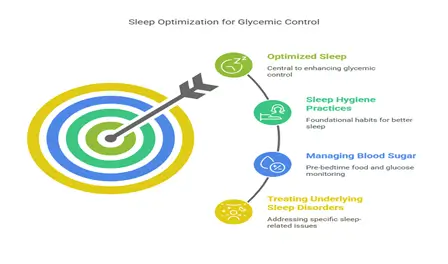
Conclusion
2. Chattu, V. K., et al. (2019). The global problem of insufficient sleep and its serious public health implications. Healthcare, 7(1), 1.
3.3. Tobaldini, E., et al. (2019). The link between sleep apnea and diabetes: Pathophysiological mechanisms and treatment implications. Acta Diabetologica, 56(10), 1123-1132.
4. Cappuccio, F. P., et al. (2020). Sleep duration predicts cardiovascular outcomes: A systematic review and meta-analysis. European Heart Journal, 41(20), 205-214.
Get a Call Back
Categories
- Life Style Modification
- Cardiac
Health Blogs
Diabetes and Sleep: A Complex Bidirectional Relationship
Diabetes and Sleep: A Complex Bidirectional Relationship Diabetes and Sleep: A Complex Bidirectional Relationship Diabetes and sleep share a bidirectional relationship, where poor
Morning Habits That Can Make or Break Your Blood Sugar Levels
Morning Habits That Can Make or Break Your Blood Sugar Levels Morning Habits That Can Make or Break Your Blood Sugar Levels Managing blood sugar levels is crucial for individuals w
The Benefits of Early Dinners: A Blend of Tradition and Science
The Benefits of Early Dinners: A Blend of Tradition and Science The Benefits of Early Dinners: A Blend of Tradition and Science In today’s fast-paced world, meal timing often
Kitchen Cures: Healing the Natural Way with Grandma’s Wisdom
Kitchen Cures: Healing the Natural Way with Grandma’s Wisdom Kitchen Cures: Healing the Natural Way with Grandma’s Wisdom Who doesn’t love quick, easy solutions to nagging he
Why Eating Nuts Before Meals is a Smart Choice
Why Eating Nuts Before Meals is a Smart Choice Why Eating Nuts Before Meals is a Smart Choice Adding a handful of nuts to the diet, especially before meals, can provide several hea
The Surprising Secret to Coffee’s Heart-Healthy Benefits: It is All About Timing
The Surprising Secret to Coffee’s Heart-Healthy Benefits: It is All About Timing The Surprising Secret to Coffee’s Heart-Healthy Benefits: It is All About Timing For many, the
5 Simple Morning Habits for a Healthier Start to the Year
5 Simple Morning Habits for a Healthier Start to the Year 5 Simple Morning Habits for a Healthier Start to the Year A new year offers a fresh opportunity to embrace healthier habit
Type 2 Diabetes and Mental Health: The Connection
Type 2 Diabetes and Mental Health: The Connection Type 2 Diabetes and Mental Health: The Connection Type 2 diabetes mellitus (T2DM) is a chronic condition affecting millions worldw
Is Sugar Really the Enemy? Unpacking Diabetes Myths
Is Sugar Really the Enemy? Unpacking Diabetes Myths Is Sugar Really the Enemy? Unpacking Diabetes Myths Diabetes is a growing public health concern worldwide, with type 2 diabetes
Tailoring the Dose of Exercise for Effective Glycemic Management in Type 2 Diabetes
Tailoring the Dose of Exercise for Effective Glycemic Management in Type 2 Diabetes Tailoring the Dose of Exercise for Effective Glycemic Management in Type 2 Diabetes Type 2 diabe
Ganesh Chaturthi and Diabetes: A Balancing Act
Ganesh Chaturthi and Diabetes: A Balancing Act Ganesh Chaturthi and Diabetes: A Balancing Act Ganesh Chaturthi, a vibrant and beloved Indian festival celebrated with great enthusia
Asthma in Children: Symptoms, Triggers, and Management
Asthma in Children: Symptoms, Triggers, and Management Asthma in Children: Symptoms, Triggers, and Management Asthma is a significant health concern among children in India, with i
Heart-Healthy Diet: Foods to Include and Avoid
Heart-Healthy Diet: Foods to Include and Avoid Heart-Healthy Diet: Foods to Include and Avoid India’s traditional diet is often heavy on carbohydrates, high-fat dairy product
Can I Donate Blood if I’m Diabetic?
Can I Donate Blood if I’m Diabetic? Can I Donate Blood if I’m Diabetic? If you’re diabetic, you may wonder whether you can donate blood. The good news is that inmany
Top Foods for Managing High Blood Pressure
Top Foods for Managing High Blood Pressure Top Foods for Managing High Blood Pressure High blood pressure is a common condition that affects millions of people worldwide. If left u
Loneliness and Diabetes: How Social Isolation Raises Your Risk
Loneliness and Diabetes: How Social Isolation Raises Your Risk Loneliness is a mental health problem that has been proven to have a significant impact on quality of life and health
Navigating Winter with Asthma in India: Tips for a Breath-Friendly Season
Navigating Winter with Asthma in India: Tips for a Breath-Friendly Season As winter sets in across India, individuals with asthma face unique challenges in managing their respirato
What is the optimal level of low-density lipoprotein (LDL) cholesterol for individuals living with heart disease?
What is the optimal level of low-density lipoprotein (LDL) cholesterol for individuals living with heart disease? LDL is considered as “bad” cholesterol as it accumulates in th
Diwali Delights: Navigating Healthy Celebration with 10 Essential Tips
Diwali Delights: Navigating Healthy Celebration with 10 Essential Tips Diwali, the festival of lights, is a time of joy, togetherness, and of course, indulgence in delicious sweets
Coping with COPD: Tips for Living Well with Chronic Obstructive Pulmonary Disease
Coping with COPD: Tips for Living Well with Chronic Obstructive Pulmonary Disease Chronic Obstructive Pulmonary Disease (COPD) is a chronic respiratory condition that can significa
How to live a healthy life after cancer?
How to live a healthy life after cancer? Cancer is definitely a debilitating disease that compromises our life’s quality and length of survival.The experience with cancer is uniq
Managing Glucose and Stress in Women with Type 2 Diabetes
Managing Glucose and Stress in Women with Type 2 Diabetes: The Power of Aerobic Exercise and Deep Breathing Diabetes is a type of metabolic disease. It has a strong connection with
Safe and Effective Exercises for Asthma Management
Safe and Effective Exercises for Asthma Management Safe and Effective Exercises for Asthma Management Asthma is a chronic lung condition that affects the airways, making it difficu
























